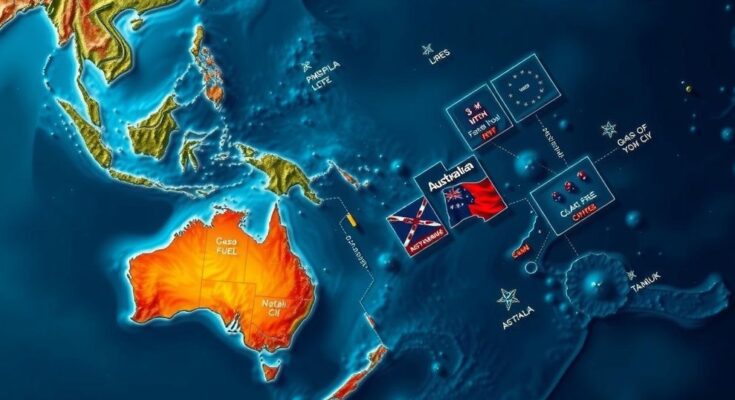Australia has chosen to align itself with fossil fuel-exporting nations in a legal battle initiated by Vanuatu regarding obligations to combat climate change. This evolution raises questions about Australia’s environmental stance as Pacific nations increasingly view climate change as a critical threat. A ruling from the International Court of Justice could redefine international obligations and significantly impact Australia’s fossil fuel strategies moving forward.
Australia is currently facing a pivotal challenge as it attempts to balance its role as a trusted partner to Pacific nations while being a significant exporter of fossil fuels. This complex situation has come to the fore, particularly as Pacific nations like Vanuatu view climate change as an imminent threat. A recent case initiated by Vanuatu at the International Court of Justice has prompted Australia to publicly align with other fossil fuel exporting nations, effectively sidelining its climate commitments.
This legal pursuit aims to outline nations’ obligations under international law to mitigate harm to the climate. The campaign, which began with law students in Vanuatu, has progressed to the International Court of Justice, where vital questions regarding states’ responsibilities to combat greenhouse gas emissions will be examined. The outcome of this case could reshape international climate law and challenge Australia’s current export policies regarding fossil fuels.
As discussions continue, Australia has reaffirmed its commitment to collaboration with Pacific nations, yet it has simultaneously sought to minimize its accountability for climate change impacts. Australian legal representatives argue that the narrow interpretation of emissions obligations should be upheld, asserting that greenhouse gases differ from direct harm caused by other pollutants. Australia further maintains that human rights obligations do not extend to climate change responsibilities, a stance which has drawn criticism.
Looking ahead, the advisory opinion from the court, due next year, could significantly impact Australia’s fossil fuel export strategy, which has seen massive growth in recent years. If the court establishes clearer responsibilities for fossil fuel-producing nations, Australia might find itself facing potential compensation claims for climate damages. Furthermore, the ongoing court proceedings may put additional strain on Australia’s relationships within the Pacific region, especially as it considers hosting future United Nations climate talks, which could signal a shift towards more sustainable practices.
The ongoing tensions surrounding Australia’s climate policy reflect a broader struggle faced by many nations that are economically reliant on fossil fuel exports. As Pacific nations contend with escalating climate consequences, they seek greater accountability from major fossil fuel exporters, including Australia. The unique legal case initiated by Vanuatu is unprecedented, raising questions about international legal obligations to address climate change and the responsibilities of states in preventing environmental harm. This case could set significant precedents in international law, influencing future climate policy.
Australia’s commitment to expanding fossil fuel exports stands at odds with the urgent calls from Pacific nations for climate responsibility. The proceedings at the International Court of Justice could redefine the legal landscape for fossil fuel emissions and challenge Australia’s export strategy. As the court prepares to issue its advisory opinion, the future of Australia’s international standing among its Pacific partners will depend on its response to the evolving climate crisis and its willingness to adapt its energy policies.
Original Source: theconversation.com




